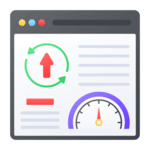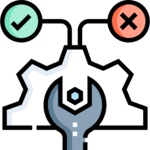Overview: Why Regular Website Maintenance is Crucial for SEO and Performance
Your website is the online representation of your company in the digitally-first world of today. Having a visually appealing website is not enough; your traffic, engagement, and conversions are all directly impacted by its performance and SEO health. Maintaining your website regularly keeps it functional, competitive, and optimized, which promotes long-term success.
1. How Website Upkeep Affects SEO
1.1 Regular Updates 
Websites that update their content frequently are rewarded by search engines. You can satisfy search engine requirements as well as user expectations by maintaining your website current, relevant, and fresh. Frequent modifications to your content structure, keywords, and metadata also let search engines know that you’re active, which helps you keep or raise your rankings.
Pro Tip: To remain current, post blogs, revise product descriptions, and occasionally reload older pages.
1.2 Repairing Damaged Links
Both user experience and SEO rankings are negatively impacted by broken links. They are seen by search engines as signs of a badly maintained website. To find and address these problems, use programs like Screaming Frog or Google Search Console.
How It Helps:
- increases the authority of the website.
- lowers bounce rates.
- enhances usability in general.
1.3 Improving Page Speed
One important ranking factor is page speed. Pages that load slowly irritate users and make it harder for search engines to crawl them. Page speed can be increased with routine maintenance by:
- images that have been compressed.
- JavaScript and CSS minification.
- lowering the response times of servers.
Quick Tip: Google PageSpeed Insights and GTmetrix are two tools that can be used to diagnose speed problems.
2. improving the user experience with UpKeep
2.1 Optimization for Mobile
A mobile-friendly website is a must, as mobile devices account for over half of all web traffic. Routine maintenance guarantees reactivity and compatibility with the newest gadgets and screen sizes.
2.2 Correcting Mistakes and Flaws
Inconsistent designs, server outages, and 404 errors can irritate users and erode their trust. Resolving these problems as soon as possible is essential to creating a flawless user experience.
2.3 Enhancing Accessibility and Navigation
Your website can be used by all users, including those with disabilities, if it follows accessibility standards (such as WCAG guidelines) and has easy-to-use navigation.
Important Steps:
- Refresh the menus for navigation.
- Give pictures alt text.
- Make sure the contrast and font sizes adhere to accessibility standards.
3. The Advantages of Website Upkeep Over Time
3.1 Higher Conversions and Traffic
A website that is optimized draws in more visitors and maintains their interest. Higher conversion rates result from faster loading times and error-free user experiences.
3.2 Strengthened Security
Older websites are the target of hackers. Frequent updates to software, plugins, and themes guard against security flaws, preserving user data and your SEO reputation.
3.3 Maintaining an Advantage Over Rivals
Regular upkeep guarantees that your website stays competitive and adjusts to algorithm changes. In the digital race, a well-maintained website is an advantage.
4. The Best Methods for Continual Website Upkeep
Perform routine audits: Utilize tools to look for security, performance, and SEO problems.
Plan Your Maintenance: To keep your site in top condition, schedule weekly, monthly, and quarterly tasks.
Employ Experts: Expert services guarantee thorough maintenance and save time.
In conclusion
To improve user experience, increase SEO, and stay ahead of the competition, website maintenance is more than just a technical requirement. You can avoid expensive problems and guarantee long-term success by taking a proactive stance.
Are you prepared to optimize your website? To keep it operating at its best, maintain it right now or get professional assistance.
FAQ
❓How frequently should I maintain my website?
The size and function of your website determine how often it needs to be maintained. At the very least:
- Every week: Update plugins and look for broken links.
- Audit performance and SEO every month.
- Review and update design components every three months.
❓Can I take care of my website on my own?
Yes, but it takes technical know-how and time. Yoast SEO, GTmetrix, and Google Search Console are some useful tools. As an alternative, employ experts for thorough upkeep.
❓How is SEO enhanced by website upkeep?
Frequent updates, error correction, speed optimization, and enhanced navigation all help to improve

